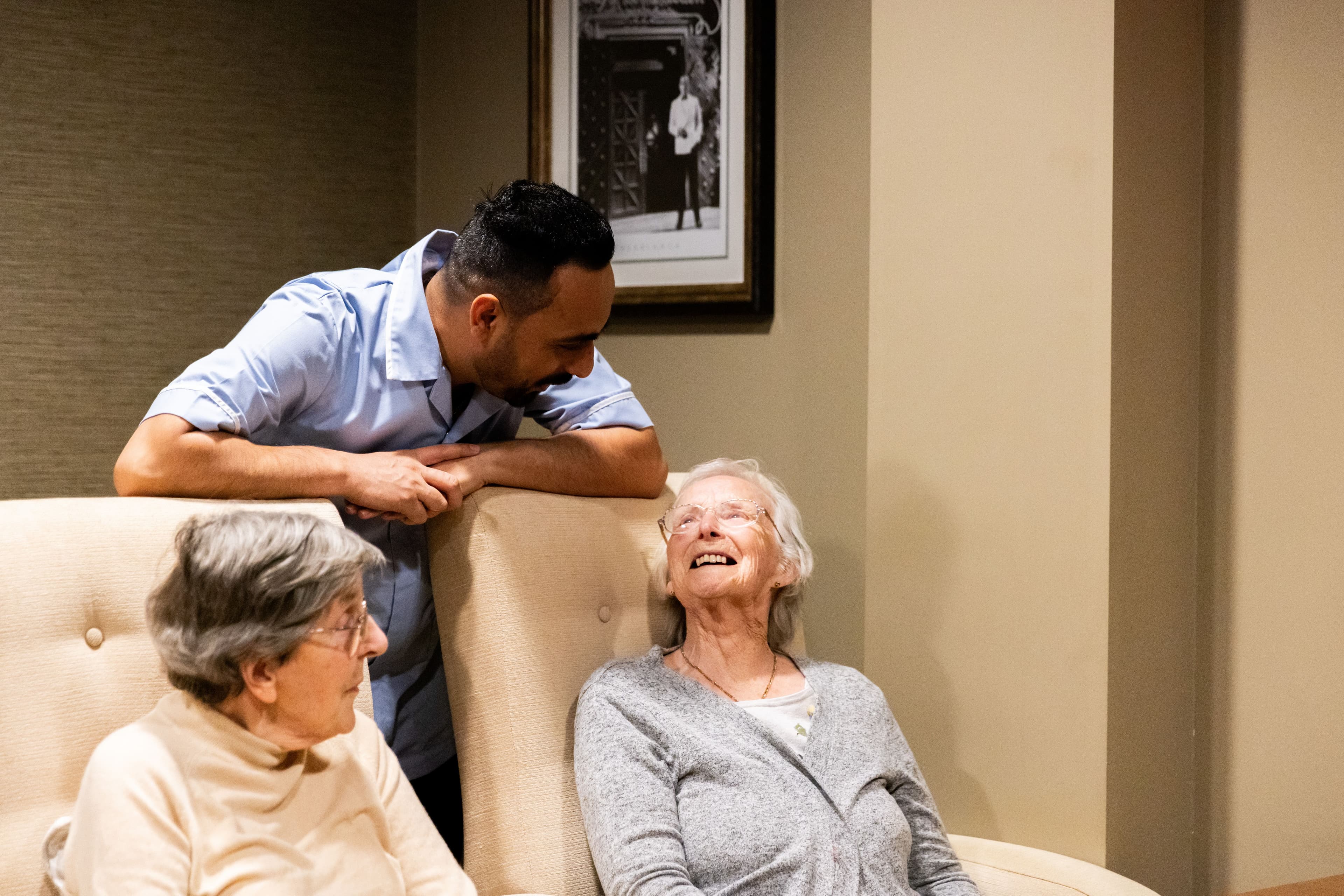Recommended Dementia Care Homes In Your Area
Simply fill out our questionnaire and we'll send you a list of personalised recommendations.
Used by over
18,000 families every month

How does Lottie help families find the right care?
Find the right dementia care home in just three simple steps...

1
Personalise your search
Let us know your care needs, budget and location, as well as your estimated move in date.

2
Compare homes
Lottie will send you a free shortlist of dementia care homes tailored to your individual needs.

3
Enquire directly
Once you've found your perfect match, enquire directly, or request further support from Lottie's team of care experts.
Start your dementia care home search today!
Enter your location to compare recommended dementia care homes near you.
What's the difference between a residential care home and a dementia care home?

Dementia care home
A dementia care home provides 24-hour support for people living with different forms of dementia. Staff are specially trained to care for those experiencing symptoms like confusion or changes in behaviour, and the setting is designed to be calm, safe and reassuring. Personalised care helps residents stay active, feel secure, and enjoy the best possible quality of life.

Residential care home
A residential care home offers support with daily tasks like washing, dressing, meals and mobility. Care is provided by trained carers, but there are no specialist dementia or nursing services. Residential care homes are a great option for people who need everyday support to live safely, but don’t require medical or memory-related care.
Why families trust Lottie to find dementia care
Proudly rated “Excellent” on Trustpilot, Lottie is the UK’s most visited directory and helps over 20,000 families find care every month.

Free expert support
Lottie’s Care Experts offer a completely free service to help you find the right dementia care, access funding options, and feel supported at every step.

Pricing transparency
Benefit from full transparency with Lottie by being able to request detailed pricing information for every care home and specific care types.

Free personalised shortlist
Need a little extra help? Get your care search off to a great start by requesting a free shortlist of recommended homes from Lottie’s team of care experts.
Other types of care explained
We know that choosing the right care home is an important decision. We're here to help you find trusted, high-quality care tailored to your needs.

Residential care
Support with everyday tasks like washing, dressing and mealtimes, provided by trained carers. A good option for those who need day-to-day help but don’t require nursing or specialist dementia care.

Nursing care
24/7 support from qualified nurses for people with complex or ongoing medical needs, such as wound care, injections, or long-term conditions, alongside help with personal care like dressing and washing.

Respite care
Respite care offers short-term stays in a care home, often for recovery, carer breaks, or to trial a longer-term stay. It’s a flexible way to experience life in a care home without committing to a permanent move.
Browse dementia care homes across the UK
- Dementia care in England
- Dementia care in Scotland
- Dementia care in Wales
- Dementia care in London
- Dementia care in Leicester
- Dementia care in Wolverhampton
- Dementia care in Nottingham
- Dementia care in Sheffield
- Dementia care in Leeds
- Dementia care in Edinburgh
- Dementia care in Bristol
- Dementia care in Coventry
- Dementia care in Luton
- Dementia care in Liverpool
- Dementia care in Swanage
- Dementia care in Bradford
- Dementia care in Hampton
- Dementia care in Glasgow
- Dementia care in Northamptonshire
- Dementia care in Haddington
- Dementia care in Cardiff
- Dementia care in Colchester
- Dementia care in Preston
- Dementia care in Milton Keynes
- Dementia care in Eastbourne
- Dementia care in Southampton
- Dementia care in Stoke-on-trent
- Dementia care in Northampton
- Dementia care in Romford
- Dementia care in Farnworth
- Dementia care in Aberdeen
- Dementia care in Dorset
- Dementia care in Birmingham
- Dementia care in Walsall
- Dementia care in Peterborough
- Dementia care in Broxbourne
- Dementia care in Norwich
- Dementia care in Ipswich
- Dementia care in Derby
- Dementia care in Sunderland
- Dementia care in Warrington
- Dementia care in Bolton
- Dementia care in Blackpool
- Dementia care in Maidstone
- Dementia care in Worthing
- Dementia care in Cheltenham
- Dementia care in Swindon
- Dementia care in Doncaster
- Dementia care in Hatfield
- Dementia care in Kendal
- Dementia care in Huddersfield
- Dementia care in Kent
- Dementia care in Dudley
- Dementia care in Solihull
- Dementia care in Worcestershire
- Dementia care in Swansea
- Dementia care in Chelmsford
- Dementia care in St. Albans
- Dementia care in Watford
- Dementia care in Croydon
- Dementia care in Harrow
- Dementia care in Peterlee
- Dementia care in Oldham
- Dementia care in Rochdale
- Dementia care in Stockport
- Dementia care in Blackburn
- Dementia care in Reading
- Dementia care in Aylesbury
- Dementia care in Plymouth
- Dementia care in Bournemouth
- Dementia care in Poole
- Dementia care in Worcester
- Dementia care in Harrogate
- Dementia care in Middlesbrough
- Dementia care in York
- Dementia care in St Albans
- Dementia care in Brackley
- Dementia care in Southport
- Dementia care in Royal Leamington Spa
- Dementia care in Darlington
- Dementia care in Surrey
- Dementia care in Wrexham
- Dementia care in Bedford
- Dementia care in Southend-on-sea
- Dementia care in Chesterfield
- Dementia care in Lincoln
- Dementia care in Bromley
- Dementia care in Enfield
- Dementia care in Sutton
- Dementia care in Chester
- Dementia care in Wigan
- Dementia care in Wirral
- Dementia care in Slough
- Dementia care in Basingstoke
- Dementia care in Portsmouth
- Dementia care in Tunbridge Wells
- Dementia care in Oxford
- Dementia care in Chichester
- Dementia care in Exeter
- Dementia care in Gloucester
- Dementia care in Bath
- Dementia care in Telford
- Dementia care in Nuneaton
- Dementia care in Barnsley
- Dementia care in Rotherham
- Dementia care in Wakefield
- Dementia care in Clacton-on-sea
- Dementia care in Scunthorpe
- Dementia care in Kettering
- Dementia care in Sidcup
- Dementia care in Surbiton
- Dementia care in Southend
- Dementia care in Bracknell
- Dementia care in Bexhill
- Dementia care in Weston-super-mare
- Dementia care in Stirling
- Dementia care in Essex
- Dementia care in Hertfordshire
- Dementia care in Isle of Wight
- Dementia care in Cornwall
- Dementia care in Basildon
- Dementia care in Brentwood
- Dementia care in Stevenage
- Dementia care in Mansfield
- Dementia care in Carlisle
- Dementia care in Bury
- Dementia care in Burnley
- Dementia care in High Wycombe
- Dementia care in Fareham
- Dementia care in Canterbury
- Dementia care in Dartford
- Dementia care in Woking
- Dementia care in Crawley
- Dementia care in Horsham
- Dementia care in Weymouth
- Dementia care in Taunton
- Dementia care in Salisbury
- Dementia care in Stourbridge
- Dementia care in Stafford
- Dementia care in Rugby
- Dementia care in Stratford-upon-avon
- Dementia care in Ayr
- Dementia care in Cumbernauld
- Dementia care in Hemel Hempstead
- Dementia care in Hertford
- Dementia care in Bury St Edmunds
- Dementia care in Loughborough
- Dementia care in Grimsby
- Dementia care in Grantham
- Dementia care in Belvedere
- Dementia care in Southall
- Dementia care in Ilford
- Dementia care in Crewe
- Dementia care in Macclesfield
- Dementia care in Hyde
- Dementia care in Newbury
- Dementia care in Fordingbridge
- Dementia care in Banbury
- Dementia care in Camberley
- Dementia care in Farnham
- Dementia care in Kidderminster
- Dementia care in Halifax
- Dementia care in Falkirk
- Dementia care in Inverness
- Dementia care in Hampshire
- Dementia care in Devon
- Dementia care in Paisley
- Dementia care in Braintree
- Dementia care in Harlow
- Dementia care in Barnet
- Dementia care in Hounslow
- Dementia care in Chorley
- Dementia care in Wokingham
- Dementia care in Winchester
- Dementia care in Folkestone
- Dementia care in Sevenoaks
- Dementia care in Guildford
- Dementia care in Torbay
- Dementia care in Chippenham
- Dementia care in Hereford
- Dementia care in Redditch
- Dementia care in Lowestoft
- Dementia care in Coalville
- Dementia care in Spalding
- Dementia care in Wellingborough
- Dementia care in Worksop
- Dementia care in Dagenham
- Dementia care in Wembley
- Dementia care in Hayes
- Dementia care in Gravesend
- Dementia care in Bognor Regis
- Dementia care in Haywards Heath
- Dementia care in Exmouth
- Dementia care in Torquay
- Dementia care in Yeovil
- Dementia care in Cannock
- Dementia care in Burton Upon Trent
- Dementia care in Keighley
- Dementia care in Fife
- Dementia care in Norfolk
- Dementia care in Derbyshire
- Dementia care in Kirkcaldy
- Dementia care in Bridgend
- Dementia care in Hinckley
- Dementia care in Ealing
- Dementia care in Durham
- Dementia care in Gateshead
- Dementia care in Salford
- Dementia care in St. Helens
- Dementia care in Maidenhead
- Dementia care in Gosport
- Dementia care in Tonbridge
- Dementia care in Banstead
- Dementia care in Dorchester
- Dementia care in Erdington
- Dementia care in West Bromwich
- Dementia care in Lichfield
- Dementia care in Newcastle-under-lyme
- Dementia care in Tamworth
- Dementia care in Bromsgrove
- Dementia care in Beverley
- Dementia care in Bridlington
- Dementia care in Scarborough
- Dementia care in Kilmarnock
- Dementia care in Hamilton
- Dementia care in Llanelli
- Dementia care in Dunstable
- Dementia care in Leighton Buzzard
- Dementia care in Wisbech
- Dementia care in Huntingdon
- Dementia care in Hitchin
- Dementia care in Felixstowe
- Dementia care in Sleaford
- Dementia care in Corby
- Dementia care in Beeston
- Dementia care in Wimbledon
- Dementia care in Middleton
- Dementia care in Timperley
- Dementia care in Leigh
- Dementia care in Accrington
- Dementia care in Hailsham
- Dementia care in Aldershot
- Dementia care in Herne Bay
- Dementia care in Sittingbourne
- Dementia care in Witney
- Dementia care in East Grinstead
- Dementia care in Berkshire
- Dementia care in Buckinghamshire
- Dementia care in West Sussex
- Dementia care in Dunfermline
- Dementia care in Cambridge
- Dementia care in Lancaster
- Dementia care in Dover
- Dementia care in Epsom
- Dementia care in Redhill
- Dementia care in Reigate
- Dementia care in Oswestry
- Dementia care in Willenhall
- Dementia care in Rutherglen
- Dementia care in Greenock
- Dementia care in Rhyl
- Dementia care in Ely
- Dementia care in St Neots
- Dementia care in Royston
- Dementia care in Welwyn Garden City
- Dementia care in Stowmarket
- Dementia care in Ilkeston
- Dementia care in Market Harborough
- Dementia care in Louth
- Dementia care in Hucknall
- Dementia care in Sutton
- Dementia care in Bexleyheath
- Dementia care in Orpington
- Dementia care in Purley
- Dementia care in Uxbridge
- Dementia care in South Shields
- Dementia care in Congleton
- Dementia care in Nantwich
- Dementia care in Widnes
- Dementia care in Whitehaven
- Dementia care in Morecambe
- Dementia care in Ormskirk
- Dementia care in Seaford
- Dementia care in Crowborough
- Dementia care in Fleet
- Dementia care in Waterlooville
- Dementia care in Lyndhurst
- Dementia care in New Milton
- Dementia care in Rochester
- Dementia care in Bicester
- Dementia care in Wantage
- Dementia care in Littlehampton
- Dementia care in Burgess Hill
- Dementia care in Paignton
- Dementia care in Evesham
- Dementia care in Bingley
- Dementia care in Ilkley
- Dementia care in Pudsey
- Dementia care in Castleford
- Dementia care in Aberdeenshire
- Dementia care in Bedfordshire
- Dementia care in Lincolnshire
- Dementia care in Cheshire
- Dementia care in Cumbria
- Dementia care in Lancashire
- Dementia care in East Sussex
- Dementia care in Oxfordshire
- Dementia care in Gloucestershire
- Dementia care in Wiltshire
- Dementia care in Shropshire
- Dementia care in Staffordshire
- Dementia care in Stonehaven
- Dementia care in Maldon
- Dementia care in Downham Market
- Dementia care in Great Yarmouth
- Dementia care in Islington
- Dementia care in Bishop Auckland
- Dementia care in Chester-le-street
- Dementia care in Blyth
- Dementia care in Cramlington
- Dementia care in Ellesmere Port
- Dementia care in Tameside
- Dementia care in Ascot
- Dementia care in Hythe
- Dementia care in Medway
- Dementia care in Newquay
- Dementia care in St Austell
- Dementia care in Truro
- Dementia care in Sherborne
- Dementia care in Trowbridge
- Dementia care in Bilston
- Dementia care in Halesowen
- Dementia care in Oldbury
- Dementia care in Smethwick
- Dementia care in Wednesbury
- Dementia care in Shrewsbury
- Dementia care in Bedworth
- Dementia care in Warwick
- Dementia care in Dumfries
- Dementia care in Colwyn Bay
- Dementia care in Leigh-on-sea
- Dementia care in Grays
- Dementia care in Borehamwood
- Dementia care in Letchworth
- Dementia care in Beccles
- Dementia care in Woodbridge
- Dementia care in Long Eaton
- Dementia care in Buxton
- Dementia care in Melton Mowbray
- Dementia care in Bourne
- Dementia care in Gainsborough
- Dementia care in Rushden
- Dementia care in Daventry
- Dementia care in Barking
- Dementia care in Beckenham
- Dementia care in Feltham
- Dementia care in Stratford
- Dementia care in Chingford
- Dementia care in Whitley Bay
- Dementia care in Bramhall
- Dementia care in Altrincham
- Dementia care in Birkenhead
- Dementia care in Hove
- Dementia care in Farnborough
- Dementia care in Andover
- Dementia care in Romsey
- Dementia care in Chipping Norton
- Dementia care in Dorking
- Dementia care in Newton Abbot
- Dementia care in Cirencester
- Dementia care in Frome
- Dementia care in Clevedon
- Dementia care in Bridgwater
- Dementia care in Burnham-on-sea
- Dementia care in Ripon
- Dementia care in Dewsbury
- Dementia care in Garforth
- Dementia care in Pontefract
- Dementia care in West Midlands
- Dementia care in Cambridgeshire
- Dementia care in Suffolk
- Dementia care in Northumberland
- Dementia care in Stockton-on-tees
- Dementia care in Somerset
- Dementia care in Herefordshire
- Dementia care in Helensburgh
- Dementia care in Carmarthenshire
- Dementia care in Newark-on-trent
- Dementia care in Lewisham
- Dementia care in Wandsworth
- Dementia care in Newton Aycliffe
- Dementia care in Hexham
- Dementia care in Billingham
- Dementia care in Northwich
- Dementia care in Winsford
- Dementia care in Windsor
- Dementia care in Beaconsfield
- Dementia care in Eastleigh
- Dementia care in Havant
- Dementia care in Horley
- Dementia care in Christchurch
- Dementia care in Stroud
- Dementia care in Keynsham
- Dementia care in Marlborough
- Dementia care in Kingswinford
- Dementia care in Tipton
- Dementia care in Bridgnorth
- Dementia care in Hessle
- Dementia care in Guisborough
- Dementia care in Selby
- Dementia care in Clydebank
- Dementia care in Carmarthen
- Dementia care in Penarth
- Dementia care in Biggleswade
- Dementia care in March
- Dementia care in Billericay
- Dementia care in Halstead
- Dementia care in Hatfield Peverel
- Dementia care in Loughton
- Dementia care in Westcliff-on-sea
- Dementia care in Ware
- Dementia care in Bushey
- Dementia care in Potters Bar
- Dementia care in Harpenden
- Dementia care in Attleborough
- Dementia care in Dereham
- Dementia care in Swaffham
- Dementia care in Thetford
- Dementia care in Hadleigh
- Dementia care in Sudbury
- Dementia care in Belper
- Dementia care in Westcliff
- Dementia care in Edgware
- Dementia care in Ruislip
- Dementia care in West Drayton
- Dementia care in New Malden
- Dementia care in Mitcham
- Dementia care in Gosforth
- Dementia care in Wilmslow
- Dementia care in Runcorn
- Dementia care in Heywood
- Dementia care in Littleborough
- Dementia care in Urmston
- Dementia care in Nelson
- Dementia care in Leyland
- Dementia care in Formby
- Dementia care in Wallasey
- Dementia care in Polegate
- Dementia care in Emsworth
- Dementia care in Southsea
- Dementia care in Chatham
- Dementia care in Margate
- Dementia care in Weybridge
- Dementia care in Caterham
- Dementia care in Godalming
- Dementia care in Haslemere
- Dementia care in Midhurst
- Dementia care in Selsey
- Dementia care in Barnstaple
- Dementia care in Bideford
- Dementia care in Rugeley
- Dementia care in Burntwood
- Dementia care in Leek
- Dementia care in Skipton
- Dementia care in Northallerton
- Dementia care in Whitby
- Dementia care in Morley
- Dementia care in Wetherby
- Dementia care in Lanarkshire
- Dementia care in West Lothian
- Dementia care in Leicestershire
- Dementia care in Warwickshire
- Dementia care in West Yorkshire
- Dementia care in Benfleet
- Dementia care in Matlock
- Dementia care in Oakham
- Dementia care in Barking and Dagenham
- Dementia care in Bexley
- Dementia care in Greenwich
- Dementia care in Hackney
- Dementia care in Hillingdon
- Dementia care in Consett
- Dementia care in Seaham
- Dementia care in Spennymoor
- Dementia care in Stanley
- Dementia care in Ashington
- Dementia care in Bedlington
- Dementia care in Newcastle Upon Tyne
- Dementia care in Darwen
- Dementia care in Amersham
- Dementia care in Chesham
- Dementia care in Marlow
- Dementia care in Thanet
- Dementia care in Clifton
- Dementia care in North East England
- Dementia care in South West England
- Dementia care in East Midlands
- Dementia care in South East England
- Dementia care in North West England
- Dementia care in Yorkshire and the Humber
Advice from Lottie’s team of care experts
Advice, guidance and support on dementia care, with every article carefully reviewed by Lottie’s care experts.
Testimonials from Lottie's care seekers
Choosing the right dementia care home is a big decision, and we’re here to support you - just like we have for many others. See what they have to say…
The service takes all the hassle and stress away. I highly recommend.
Emma
22nd February 2025
The information and advice I received from Lottie was so helpful. I can't thank them enough. I came off the phone clearly knowing the care options for my dear mum.
Sue
19th February 2025
Lottie is the 1st organisation I have come across who have been willing to understand and help.
Jacqueline
23rd January 2025
Eva paves the way with compassion, diligence and deep knowledge of the care sector. And for that we will be forever grateful.
Louise
17th December 2024
The site showed local homes with availability, CQC ratings, and more. Staff followed up with tips and compassion. So helpful.
Rosemary
13th December 2024
Eva’s quick, compassionate help gave us a shortlist for Mum with vascular dementia. Her support made our journey possible.
Louise
14th August 2024
Klara found help for my mother-in-law with dementia. She was kind, understanding, and really listened. So grateful.
Nalini
6th June 2024
Frequently asked questions about dementia care homes
How much does a dementia care home cost?
Here's a breakdown of average dementia care home costs by type:
- Dementia Care: £1,449 per week; £5,796 per month
- Nursing Dementia Care: £1,597 per week; £6,388 per month
Read our full guide to dementia care home costs in the UK.
Do those living with dementia have to pay care home fees?
Not always. It depends on the person’s care needs and financial situation. After a care needs assessment and financial assessment, the local council will decide whether the person must contribute towards the cost.
Some people pay in full (self-funders), while others receive support from the council or NHS. In most cases, people with dementia do pay something, unless they qualify for local authority funding or NHS Continuing Healthcare, which covers the full cost of care.
So while a dementia diagnosis doesn’t automatically mean free care, support is available, depending on the person’s needs and circumstances.
When should someone living with dementia go into a care home?
There’s no set time that’s right for everyone, but a move to a care home may be needed when it’s no longer safe or manageable for someone to stay at home.
This could be due to things like:
- Struggling with everyday tasks, such as eating, washing, or using the stairs.
- Safety concerns, like frequent falls or getting lost when leaving the house.
- A change in circumstances, such as a carer becoming unwell or home care no longer being enough.
- Increased care needs after a hospital stay or due to other health conditions.
- Behavioural changes or distress that become difficult for family or carers to manage.
If the person is no longer coping at home, or their carers feel overwhelmed, a care home can provide the consistent support they need. A care needs assessment (and a carer’s assessment for family carers) can help identify the right level of support and whether moving into care is the best next step.
Making the decision is never easy, but you’re not alone. Our Care Experts are here to talk it through and help you explore the options at your own pace, and you can request a free shortlist of the best dementia care available in your local area, personalised for your unique needs.
Can someone with dementia choose their own care home?
If your loved one who is living with dementia is still able to make decisions about their care, they have the right to choose whether to move into a care home. They may need support to understand their options, but the decision must be their own.
If they can no longer decide for themselves, someone else will need to make the decision in their best interests. This could be a family member, an attorney (if there’s a lasting power of attorney in place), or health and care professionals involved in their support.
When making this decision, your loved one’s views and wishes should still be considered as much as possible. It’s also important to think about whether they’re safe at home, and whether family or friends can realistically meet their care needs.
Planning ahead, including creating an advance care plan or setting up a lasting power of attorney can help ensure their wishes are known and respected if they’re no longer able to express them later on.
Are dementia care homes more expensive than residential care homes?
Yes, dementia care homes are usually more expensive than standard residential care homes. This is because dementia care often involves a higher level of support, including specially trained carers, tailored activities, and additional safety measures to meet the needs of people living with dementia.
The cost can vary depending on location, the care home itself, and the individual’s specific care needs.
The average weekly cost of a dementia care home in the UK is £1,449, compared to £1,406 for a residential care home.
Does the NHS pay for dementia care?
In some cases, yes. The NHS may cover the full cost of dementia care through NHS Continuing Healthcare (CHC), but this depends on how complex and severe a person’s health needs are, not just the dementia diagnosis itself.
To find out if someone qualifies, they’ll need an assessment. If eligible, CHC can fund care at home or in a care home. If not, they may still get NHS-funded nursing care, which covers part of the cost of a nursing home.
Read more on this topic in our resources about NHS Continuing Healthcare and NHS-funded nursing care.
Can I get help with paying for dementia care?
Yes — many families are eligible for financial support to help with the cost of dementia care. If your loved one has complex health needs linked to their dementia, they may qualify for NHS Continuing Healthcare, which can cover the full cost of their care.
Depending on your loved one’s income, savings, and care needs, you may also be able to access funding from their local council. The first step is usually a financial assessment, and sometimes a care needs assessment, too.
We understand how confusing this process can be. That’s why we’ve created a simple funding guide for dementia care — so you can understand what you’re entitled to and what support is available.
Will my loved one still have independence in a dementia care home?
Yes — dementia care homes are designed to support independence while keeping your loved one safe.
A good dementia care home encourages residents to make choices about their daily routine, from what they wear to how they spend their day. Many homes use familiar, reassuring layouts, signage, and personalised spaces to help reduce confusion and maintain confidence.
Staff are trained to offer gentle, respectful support that promotes independence as much as possible while always being there when needed.
What should I ask during a visit to a dementia care home?
Visiting in person is the best way to understand whether a home feels right. You might ask:
- How is care tailored to each resident's type and stage of dementia?
- How do staff support residents during moments of distress or confusion?
- What does a typical day look like?
- How are families kept informed and involved in care plans?
- Can personal items be brought in to help the room feel familiar?
Most importantly, observe how staff interact with residents. Is it with patience, kindness, and calm? Trust your instincts: does the home feel warm, safe, and welcoming?
What types of activities are offered?
Dementia care homes can offer a wide range of activities to support wellbeing, independence, and joy. These often include:
- Music sessions and reminiscence therapy.
- Gentle movement or chair-based exercises.
- Baking, crafts, gardening, and sensory games.
- One-to-one time for conversation or quiet reflection.
- Group activities designed to encourage connection and familiarity.
The best homes tailor their activity programmes to each person’s background and preferences so that everyone can feel engaged and included.
Can residents still enjoy their hobbies in a dementia care home?
Absolutely — continuing with your favourite hobbies and interests is a big part of maintaining identity and wellbeing. Whether it’s gardening, painting, puzzles, music, or simply reading the newspaper each morning, staff will support residents in continuing to do what they love safely and with as much independence as possible.
Many care homes also create personalised activity plans and encourage families to share details about their loved one’s routines and interests so care feels familiar and meaningful.
What kind of personal care do residents receive?
Residents receive support tailored to their specific needs, which may include help with washing, dressing, going to the toilet, eating, and taking medication. Care is always delivered with dignity and kindness. Staff are trained to support people living with dementia in a calm and reassuring manner.
Every resident has a care plan that reflects their physical and emotional needs, as well as any preferences around routines, the gender of carers, and cultural or religious considerations.
How do dementia care homes support emotional wellbeing?
Dementia care isn’t just about physical support — it’s also about helping people feel safe, valued, and connected.
Homes may use sensory rooms, quiet spaces, and calming routines to ease anxiety or confusion. Staff are trained in dementia-specific communication, including non-verbal techniques, to build trust and understanding.
Emotional wellbeing is also supported through meaningful activities, social connections, and continuity of care so residents feel known, not just looked after.
Family involvement plays a key role, too. Many homes encourage regular visits and updates so relatives feel part of their loved one’s care journey every step of the way.
Looking for a specific provider?
Dementia care trends and insights from Lottie
Drawn from Lottie’s internal search and enquiry data, these insights reveal key trends amongst dementia care seekers.
Many people need dementia care to start quickly
40% of people are looking to move into a dementia care home as soon as possible, while a further 37% are looking for care that’ll start within the next 3 months. Only around 20% of people search for dementia care more than 3 months in advance.
If you’re searching under time pressure, you’re not alone. Care needs can change quickly, and we’re here to help you move forward with clarity and confidence.
Let us help you find dementia care with availability now: request a free list of dementia care homes tailored to your needs.
One in four people are looking for short-term dementia care
23% of dementia care seekers are looking for short-term respite support rather than moving into a home longer term. This might be for a break in family care, post-hospital recovery, or simply to trial a care home setting before making a long-term decision.
Looking for respite dementia care? Let our Care Experts find you a list of homes offering dementia respite care. You can also learn more about respite care before making any decisions.
Comfort and familiarity matter most in dementia care
When searching for dementia care on Lottie, families often filter for features like gardens, communal dining spaces, and the option to bring personal furniture. Familiar touches and being able to enjoy time outdoors make a big difference, helping loved ones feel safe and settled.
For many families, choosing a homely setting that mirrors aspects of everyday life is just as important as any clinical care required, and can make the transition feel gentler for everyone involved.
Expert advice: how to choose a dementia care home
As a qualified care adviser - and someone who’s helped many families navigate the challenges of dementia care - I know how emotional this decision can be. These three steps can help you feel more confident when choosing the right dementia care setting for your loved one:
Look for homes that specialise in dementia care. Use Lottie to find dementia-friendly homes offering residential or nursing care if needs change. Do they offer calming spaces and secure outdoor areas? All of these are important for comfort and independence.
Visit a few homes. Arrange visits where possible so you can get a real feel for the atmosphere: is the home calm, welcoming, and easy to navigate? How to carers interact with residents? Do they engage with them in a warm, friendly way?
Ask plenty of questions. Find out how care is personalised to each resident’s needs, how changes in behaviour are supported, and how families stay involved in care planning and updates. Ask about activities that help residents stay active and maintain familiar routines.
-Hannah Karim, Customer Care Lead at Lottie.















